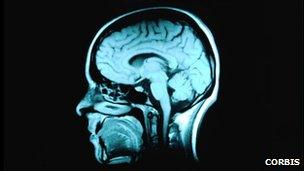'Human enhancement' comes a step closer
- Published
- comments

Will only the rich benefit from TDCS?
Have you ever wondered what it would be like to be much cleverer than you are?
Perhaps, if he'd been just a little bit smarter, Einstein might have been able to unite general relativity with quantum mechanics and come up with a unified Theory Of Everything. Then again, maybe it's enough just to be able to help with your children's maths homework or learn a new language.
Until recently, even such limited ambitions remained firmly in the realm of science fiction, but now scientists researching a new non-invasive brain stimulation technique at Oxford University believe they may have found the answer.
Transcranial Direct Current Stimulation, or TDCS, involves passing a small electric current across specific regions in the brain.
Originally developed to help patients suffering from brain injuries like stroke and learning difficulties, tests in healthy adults show it can also be used to enhance overall cognitive performance. Depending on which part of the brain is stimulated TDCS can be used to improve language and maths ability, problem solving, attention span, memory and even movement and coordination.
"It's not a magic pill" says Dr Roi Cohen Kadosh who lead the research at the University's Department of Experimental Psychology. "You still have to work hard, but it is going to improve the results of that work, enhancing your performance, allowing you to learn more easily and achieve more."
Oxford Univ's Roi Cohen Kadosh: Stimulating the brain makes it easier to learn new information
Crucially subjects didn't just perform better at the time, the improvement was still there when Dr Cohen Kadosh retested participants six months later.
Because you still have to do the work, and because Transcranial Direct Current Stimulation is potentially cheap, painless and simple to use, it raises the very real possibility that its use could soon become widespread.
Writing in the latest edition of the journal Current Biology, Dr Cohen Kadosh has teamed up with the Oxford ethicist Julian Savulescu to consider the implications.
"This could be the first step down a path not only to maximising human potential but to increasing it" Professor Savulescu says. "It has significant potential advantages to every human being because the capacity to learn is fundamental to our humanity".
The crucial question, he argues, is whether TDCS would be available to everybody, or just the preserve of the rich.
"If some people have access to a technology and others don't that creates inequality, conferring an unfair advantage. But this looks like it could be relatively cheap, and if it's as cheap as other stimulants like caffeine then everyone should have the opportunity to utilise it."
The Cambridge neuroscientist Barbara Sahakian is not so sure. Speaking on the programme this morning she questioned whether it would be a good idea to use electrical stimulation on the brains of children swatting for exams.
"These are powerful tools, and when we do these studies we have to consider the risk benefit analysis. I don't think we know enough about the long-term safety of these techniques to justify using them on the developing brains of children."
Assessing the safety of TDCS is a vital next step according to Dr Roi Cohen Kadosh. But if it is safe, then why not be the best you can be?
It seems that Mary Shelley may have been on to something after all.